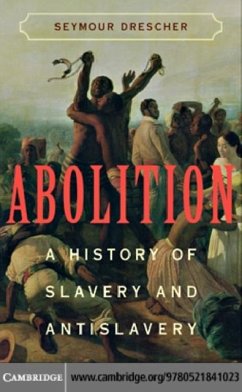Dieser Download kann aus rechtlichen Gründen nur mit Rechnungsadresse in A, B, BG, CY, CZ, D, DK, EW, E, FIN, F, GR, HR, H, IRL, I, LT, L, LR, M, NL, PL, P, R, S, SLO, SK ausgeliefert werden.

Die Literatur zum Aufstieg und Fall der Sklaverei ist umfangreich. Gleichwohl gewinnt Seymour Drescher dem Gegenstand neue Perspektiven ab. Der in Pittsburgh lehrende Historiker und Altmeister der Abolitionsforschung zeichnet in seinem neuen Buch nach, wie Sklaverei seit der Mitte des fünfzehnten Jahrhunderts "dazu beitrug, die Welt zu verändern, während zugleich die Welt die Sklaverei transformierte". Wohltuend ist seine nüchtern-differenzierte Analyse der muslimischen Sklaverei, deren Bedeutung er hervorhebt, ohne den Islam pauschal zu dämonisieren. In den Amerikas etablierten die Europäer Plantagenkolonien, die, wie Drescher betont, als "das dynamischste, produktivste und ausbeuterischste System unfreier Arbeit in der Geschichte der Menschheit" bezeichnet werden müssen. Aber es waren wiederum Europäer, die dieses System um 1800 desavouierten und erfolgreich zu Fall brachten. Einige Dekaden später wurde die koloniale Eroberung Afrikas nicht zuletzt mit dem Anspruch gerechtfertigt, die Sklaverei zu bekämpfen. Die Umsetzung erfolgte sehr zurückhaltend. Vor allem aber kehrte, schreibt Drescher, die Sklaverei im zweiten Viertel des zwanzigsten Jahrhunderts auf jenen Kontinent zurück, der sich so stolz als Vorreiter im Kampf gegen dieses Verbrechen gegen die Menschlichkeit entworfen hatte: Der Autor interpretiert die sowjetischen GULags und die nationalsozialistischen Arbeits- und Konzentrationslager dezidiert als Teil der Geschichte der Sklaverei. (Seymour Drescher: "Abolition". A History of Slavery and Antislavery. Cambridge University Press, New York 2009. 471 S., br., 26,99 [Euro].)
eck
Alle Rechte vorbehalten. © F.A.Z. GmbH, Frankfurt am Main









